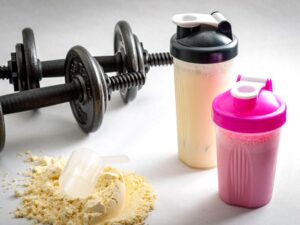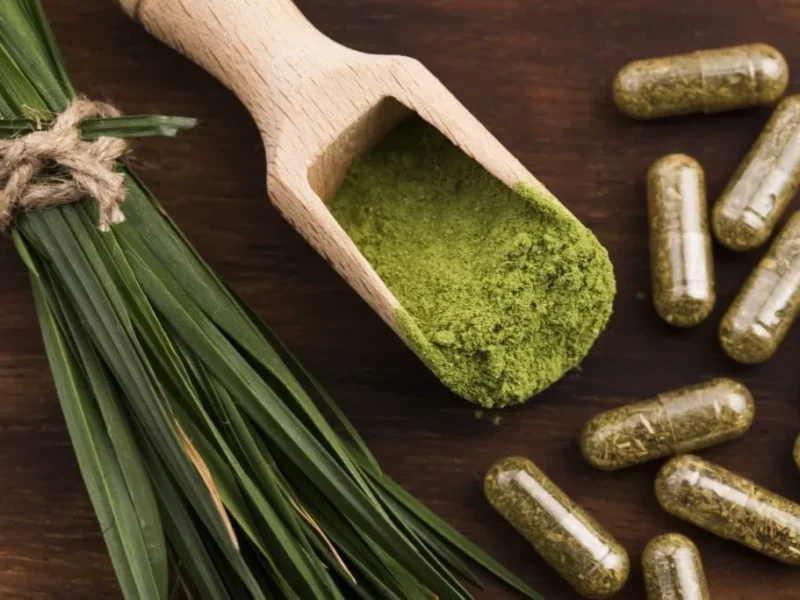
Caffeine
What Works:
Caffeine is one of the most extensively studied stimulants, known for its ability to enhance stamina and alertness. Found in coffee, tea, and many energy drinks, caffeine can significantly improve physical performance.
- Mechanism: Caffeine blocks adenosine receptors in the brain, which helps to reduce the perception of effort and fatigue.
- Benefits: Increased alertness, enhanced endurance, and improved focus.
- Dosage: 3-6 mg per kg of body weight, consumed 30-60 minutes before exercise.
What Doesn’t:
Despite its benefits, excessive caffeine consumption can lead to negative side effects such as jitteriness, increased heart rate, and sleep disturbances. Additionally, regular use can result in tolerance, diminishing its effectiveness.
Creatine
What Works:
Creatine is a naturally occurring compound in muscle cells, extensively researched for its role in energy production, particularly in high-intensity, short-duration activities.
- Mechanism: Creatine increases the availability of ATP (adenosine triphosphate), the primary energy carrier in cells.
- Benefits: Improved muscle strength, increased muscle mass, and enhanced performance in high-intensity activities.
- Dosage: A loading phase of 20 grams per day for 5-7 days, followed by a maintenance dose of 3-5 grams per day.
What Doesn’t:
Creatine is generally safe but can cause water retention and digestive issues in some individuals. It is also less effective for those who already have high levels of muscle creatine.
Beta-Alanine
What Works:
Beta-alanine is an amino acid that enhances muscular endurance and reduces fatigue, making it particularly beneficial for both high-intensity and endurance exercises.
- Mechanism: Beta-alanine increases levels of carnosine in muscles, which helps buffer acid build-up during exercise.
- Benefits: Reduced muscle fatigue, increased endurance, and improved performance in activities lasting 1-4 minutes.
- Dosage: 2-5 grams per day, often taken in divided doses to reduce the risk of tingling sensations.
What Doesn’t:
Some individuals experience paresthesia, a harmless but uncomfortable tingling sensation, when taking beta-alanine. Dividing the doses throughout the day can help mitigate this effect.
Branched-Chain Amino Acids (BCAAs)
What Works:
BCAAs, including leucine, isoleucine, and valine, are essential amino acids crucial for muscle protein synthesis and energy production during prolonged exercise.
- Mechanism: BCAAs serve as an energy source for muscles and help reduce muscle breakdown during prolonged exercise.
- Benefits: Reduced muscle soreness, decreased fatigue, and improved muscle recovery.
- Dosage: 5-10 grams before or during exercise.
What Doesn’t:
The benefits of BCAAs can be overstated. While they are beneficial, they are not a substitute for a balanced diet rich in protein. Some studies suggest that whole protein sources may be more effective for muscle recovery and endurance.
Nitric Oxide Boosters
What Works:
Nitric oxide (NO) boosters, such as beetroot juice and L-arginine, are popular for enhancing endurance by improving blood flow.
- Mechanism: NO increases vasodilation, which improves blood flow and oxygen delivery to muscles.
- Benefits: Improved endurance, reduced fatigue, and enhanced exercise performance.
- Dosage: Beetroot juice: 500 ml 2-3 hours before exercise; L-arginine: 6-10 grams per day.
What Doesn’t:
Individual responses to NO boosters can vary. Some people may not experience significant benefits, and the taste of beetroot juice can be off-putting.
Iron
What Works:
Iron is essential for the production of hemoglobin, which carries oxygen in the blood. Supplementing with iron can be particularly beneficial for individuals with low iron levels, such as menstruating women and endurance athletes.
- Mechanism: Iron improves oxygen transport in the blood, enhancing aerobic capacity and reducing fatigue.
- Benefits: Increased energy levels, improved endurance, and reduced fatigue.
- Dosage: Typically 18 mg per day for women and 8 mg per day for men, but this can vary depending on individual needs.
What Doesn’t:
Iron supplements can cause gastrointestinal issues like constipation and nausea. It’s essential to get your iron levels tested before starting supplementation to avoid excess iron, which can be harmful.
Rhodiola Rosea
What Works:
Rhodiola rosea is an adaptogenic herb known for its ability to reduce fatigue and improve physical and mental performance.
- Mechanism: Rhodiola enhances energy production in cells and helps mitigate the effects of physical and mental stress.
- Benefits: Reduced fatigue, improved endurance, and better stress management.
- Dosage: 200-600 mg per day, taken in divided doses.
What Doesn’t:
Rhodiola’s effects can vary between individuals. Some may not experience significant benefits, and high doses can cause mild side effects like dizziness and dry mouth.
Cordyceps
What Works:
Cordyceps is a type of mushroom used in traditional Chinese medicine to enhance stamina and reduce fatigue.
- Mechanism: Cordyceps increases ATP production and improves oxygen utilization in the body.
- Benefits: Enhanced stamina, improved oxygen uptake, and
reduced fatigue.
- Dosage: 1-3 grams per day, often standardized to 10% cordycepic acid.
What Doesn’t:
Cordyceps supplements can be expensive, and not all products on the market are of high quality. It’s crucial to choose a reputable brand to ensure efficacy and safety.
Ashwagandha
What Works:
Ashwagandha is an adaptogenic herb that has been shown to improve endurance, reduce stress, and enhance overall physical performance.
- Mechanism: Ashwagandha reduces cortisol levels and enhances energy production in cells.
- Benefits: Increased endurance, reduced stress, and improved overall well-being.
- Dosage: 300-500 mg of a standardized extract (containing 5% withanolides) taken twice daily.
What Doesn’t:
Ashwagandha is generally safe for most people, but it can cause mild side effects like gastrointestinal upset in some individuals. It’s also important to consult with a healthcare provider before starting ashwagandha, especially if you have thyroid issues or are pregnant.
Coenzyme Q10 (CoQ10)
What Works:
CoQ10 is a naturally occurring antioxidant that plays a crucial role in energy production within cells.
- Mechanism: CoQ10 supports mitochondrial function and energy production.
- Benefits: Improved energy levels, enhanced endurance, and reduced oxidative stress.
- Dosage: 100-200 mg per day, preferably taken with a meal containing fat for better absorption.
What Doesn’t:
While CoQ10 is effective for many, some individuals may not notice significant improvements in stamina. Additionally, CoQ10 can interact with certain medications, such as blood thinners, so it’s essential to consult with a healthcare provider before starting supplementation.
Conclusion
When it comes to supplements for stamina, choosing those with scientific backing and proven efficacy is essential. While many supplements can enhance endurance and reduce fatigue, their effectiveness can vary based on individual needs and responses. Here’s a summary of what works and what doesn’t:
What Works:
- Caffeine: Boosts alertness and reduces perceived effort.
- Creatine: Enhances muscle function and recovery.
- Beta-Alanine: Delays muscle fatigue.
- BCAAs: Reduces muscle soreness and fatigue.
- Nitric Oxide Boosters: Improves blood flow and oxygen delivery.
- Iron: Essential for oxygen transport and energy levels.
- Rhodiola Rosea: Reduces fatigue and improves performance.
- Cordyceps: Enhances oxygen uptake and stamina.
- Ashwagandha: Reduces stress and boosts endurance.
- CoQ10: Supports energy production and reduces fatigue.
What Doesn’t:
- Overconsumption of caffeine can lead to jitteriness and sleep disturbances.
- Creatine may cause water retention and digestive issues.
- BCAAs are less effective than whole protein sources for muscle recovery.
- Nitric oxide boosters’ effectiveness can vary, and some may not see significant benefits.
- Excess iron can be harmful if not needed.
- High doses of Rhodiola can cause mild side effects.
- Not all Cordyceps products are of high quality.
- Ashwagandha can cause mild gastrointestinal upset in some.
- CoQ10 may not significantly improve stamina for everyone and can interact with medications.
Always consult with a healthcare provider before starting any new supplement regimen, especially if you have underlying health conditions or are taking other medications. By making informed choices and using supplements wisely, you can enhance your stamina and overall wellness effectively.










